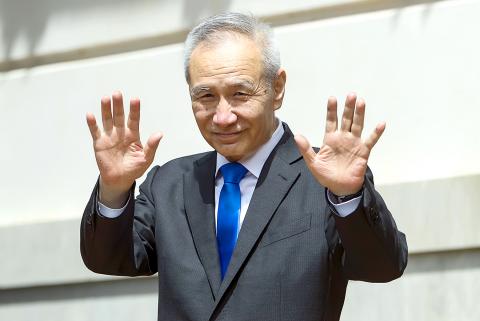Chinese Vice Premier Liu He (劉鶴), head of the country’s negotiation team in trade talks with the US, is to sign a “phase 1” deal in Washington next week, the Chinese Ministry of Commerce said yesterday.
Liu is to visit Washington from Monday to Wednesday next week, ministry spokesman Gao Feng (高峰) told reporters at a regular briefing.
Negotiating teams from both sides remain in close communication on the particular arrangements of the signing, he said.

Photo: EPA-EFE
The phase 1 deal with China would be signed on Wednesday at the White House, US President Donald Trump said on Tuesday last week.
Trump also said that he would sign the deal with “high-level representatives of China,” and that he would later travel to Beijing to begin talks on the next phase.
The US launched the trade dispute with Beijing a year-and-a-half ago over allegations of unfair trade practices, such as theft of US intellectual property and subsidies that unfairly benefit Chinese state-owned companies.
The phase 1 deal reached last month is expected to cut tariffs and boost Chinese purchases of US farm, energy and manufactured goods, while addressing some disputes over intellectual property.
However, no version of the text has been made public and Chinese officials have yet to publicly commit to key points, such as increasing imports of US goods and services by US$200 billion over two years.
China would not increase its annual low-tariff import quotas for corn, wheat and rice to accommodate stepped-up purchases of farm goods from the US, local media group Caixin quoted Chinese Vice Minister of Agriculture and Rural Affairs Han Jun (韓俊) as saying on Tuesday.
The move could make it more difficult for Beijing to meet import commitments in the trade deal due to be signed next week.
The agreement would likely double China’s US$24 billion in pre-trade dispute purchases to between US$40 billion and US$50 billion annually, US President Donald Trump said last month.
When asked if China would have to reduce grain imports from other countries to meet its US commitments, Gao said that China would continue to improve the administration of tariff quotas for wheat, corn and soybeans in accordance with WTO commitments, and would make full use of quotas according to market conditions.
This is not inconsistent with expanding agricultural imports from the US, Gao said.

Vincent Wei led fellow Singaporean farmers around an empty Malaysian plot, laying out plans for a greenhouse and rows of leafy vegetables. What he pitched was not just space for crops, but a lifeline for growers struggling to make ends meet in a city-state with high prices and little vacant land. The future agriculture hub is part of a joint special economic zone launched last year by the two neighbors, expected to cost US$123 million and produce 10,000 tonnes of fresh produce annually. It is attracting Singaporean farmers with promises of cheaper land, labor and energy just over the border.

US actor Matthew McConaughey has filed recordings of his image and voice with US patent authorities to protect them from unauthorized usage by artificial intelligence (AI) platforms, a representative said earlier this week. Several video clips and audio recordings were registered by the commercial arm of the Just Keep Livin’ Foundation, a non-profit created by the Oscar-winning actor and his wife, Camila, according to the US Patent and Trademark Office database. Many artists are increasingly concerned about the uncontrolled use of their image via generative AI since the rollout of ChatGPT and other AI-powered tools. Several US states have adopted

KEEPING UP: The acquisition of a cleanroom in Taiwan would enable Micron to increase production in a market where demand continues to outpace supply, a Micron official said Micron Technology Inc has signed a letter of intent to buy a fabrication site in Taiwan from Powerchip Semiconductor Manufacturing Corp (力積電) for US$1.8 billion to expand its production of memory chips. Micron would take control of the P5 site in Miaoli County’s Tongluo Township (銅鑼) and plans to ramp up DRAM production in phases after the transaction closes in the second quarter, the company said in a statement on Saturday. The acquisition includes an existing 12 inch fab cleanroom of 27,871m2 and would further position Micron to address growing global demand for memory solutions, the company said. Micron expects the transaction to

A proposed billionaires’ tax in California has ignited a political uproar in Silicon Valley, with tech titans threatening to leave the state while California Governor Gavin Newsom of the Democratic Party maneuvers to defeat a levy that he fears would lead to an exodus of wealth. A technology mecca, California has more billionaires than any other US state — a few hundred, by some estimates. About half its personal income tax revenue, a financial backbone in the nearly US$350 billion budget, comes from the top 1 percent of earners. A large healthcare union is attempting to place a proposal before